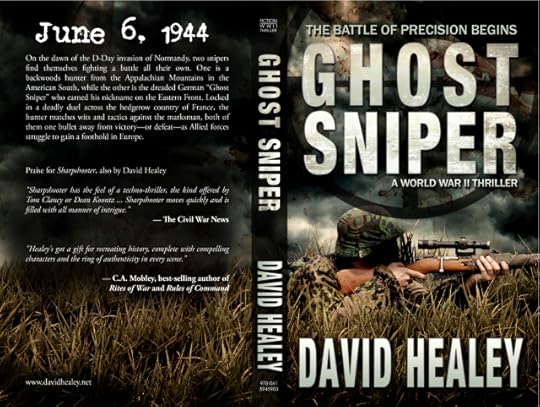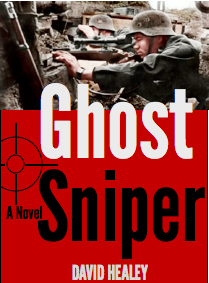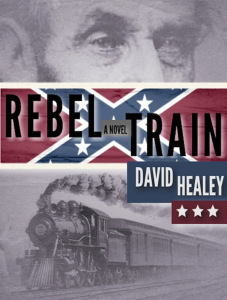David Healey's Blog, page 19
February 16, 2014
Where do writers get their ideas?
 Someone asked me the other day where writers get their ideas. That’s a popular question, and one I have the hardest time answering because ideas come from everywhere at once and nowhere in particular!
Someone asked me the other day where writers get their ideas. That’s a popular question, and one I have the hardest time answering because ideas come from everywhere at once and nowhere in particular!
It’s kind of a lame answer to a sincere question and I usually don’t admit in public that I don’t know, or I’ll give a vague answer. Most people don’t want to hear, “I don’t know!” And most writers are in the business of making people happy, so we come up with some kind of response.
Another pat answer might be that writers don’t find ideas—they find me. I’ve heard some writers say that, but it’s not true in my case. Also, that explanation sounds supercilious.
So where do ideas come from?
It probably helps to do lots of things that don’t involve writing to come up with good ideas. Vacuum the living room. Walk the dog. Make a pot of gumbo. Zap! You’ll get an idea, and you can tell a good one because it’s like getting Creole spice in that little slice where you nicked yourself chopping onions. Not exactly painful, but insistent.
I had a really good idea recently while watching a really bad movie. I mean, it was really an awful action movie without a hint of character development or humanity (but the explosions and special effects were pretty cool). So my mind was wandering … and Zap!
Exercise is always great for ideas. Walking and bike riding are good, but it helps to do them in a way where you are pretty much alone so that your mind churns away like the gears on a bike.
Sometimes I get great ideas when I’m driving, but I really try not to do that too much because, well, I’m driving.
The trouble is that writers don’t need one good idea, or even two or three. They need twenty, thirty, two hundred or three hundred good ideas. Some fizzle pretty quickly, while others go the distance.
One of my favorite writers, William Styron, once said something along the lines of, “Any idea that survives the hangover is a good one.”
I can honestly say I’ve never had a good idea as a result of alcohol. Of course, I’m not William Styron, who wrote “Sophie’s Choice,” so it may have worked for him.
Caffeine, on the other hand, sends thoughts bouncing around like a ping pong ball.
Agatha Christie one said that she got her best ideas while doing the dishes. There’s something charming about the thought of Dame Agatha thinking up the plot for “Death on the Nile” while rinsing out the tea cups.
Sometimes I’ll just sit with a blank notebook and a pen, just to see what develops on the page. In my writing classes I often talk with students about brainstorming or pre-writing techniques such as clustering, listing and free writing. Sometimes my “brainstorming” uses all three techniques on the same page like an ultimate fighter mixing boxing and karate in the ring.
That’s OK. There is no right way or wrong way to figure out what to write.
In the end, I suppose it’s hard to explain to someone how it all works because it’s trying to explain a creative process that’s beyond explaining. You might as well ask electricity how it turns on a light bulb.
Have you ever tried to explain—really explain—to a child how electricity works? Now imagine trying to explain this concept to a time traveler from the Dark Ages. In either case, you’ll probably give up after a while and tell them it’s magic.
Exactly!
So where do ideas come from? Magic! That’s not exactly true, but it’s close enough.


February 8, 2014
Ghost Sniper cover revealed for the print edition

The full print cover, front and back, for GHOST SNIPER.
Here it is folks, the “full” cover for the print edition of GHOST SNIPER. (Of course, the ebook edition only requires a front cover because ebooks don’t have back covers!)
What’s particularly cool about this book cover is that it has a matte finish, which is something I’ve wanted on one of my books for long time, but haven’t been able to convince anyone to do … with the exception of The History Press, which issues its nonfiction books with a matte (non-glossy) cover.
Here’s the back cover copy:
June 6, 1944. On the dawn of the D-Day invasion of Normandy, two snipers find themselves fighting a battle all their own. One is a backwoods hunter from the Appalachian Mountains in the American South, while the other is the dreaded German “Ghost Sniper” who earned his nickname on the Eastern Front. Locked in a deadly duel across the hedgerow country of France, the hunter matches wits and tactics against the marksman, both of them one bullet away from victory—or defeat—as Allied forces struggle to gain a foothold in Europe.
The cover designer also included a couple of “blurbs” for SHARPSHOOTER because it’s a related book and we didn’t have any handy for the new novel:
Praise for Sharpshooter, also by David Healey
“Sharpshooter has the feel of a techno-thriller, the kind offered by Tom Clancy or Dean Koontz … Sharpshooter moves quickly and is filled with all manner of intrigue.” — The Civil War News
”Healey’s got a gift for recreating history, complete with compelling characters and the ring of authenticity in every scene.” — C.A. Mobley, best-selling author of Rites of War and Rules of Command
The print books are now on their way, or so I’ve been told, and should be available soon. Thanks for taking a look!


January 29, 2014
Writing goals for the year ahead
 I’m a bit late this year with my New Year’s writing goals (let’s not call them “resolutions”) but considering that we’re still in the first chapter of 2014, here goes:
I’m a bit late this year with my New Year’s writing goals (let’s not call them “resolutions”) but considering that we’re still in the first chapter of 2014, here goes:
– First and foremost I’m starting a new full time job this year as a writing teacher. I’m looking forward to meeting lots and lots of new students and sharing my love for writing with them!
– In the year ahead, I hope to publish three books, starting with GHOST SNIPER, a World War II thriller set at D-Day to coincide with the 70th anniversary of the Normandy invasion. The ebook version is already out from Intracoastal, with the print version to follow early this year.
– Next up is BEACH BODIES, a thriller set at Rehoboth Beach and Lewes, Delaware. I don’t enjoy reading really violent “serious” crime novels, so it should come as no surprise that BEACH BODIES is a bit on the “spoofy” (is that an actual adjective?) side but perfect to read at the beach, possibly right on the beaches mentioned in the book. I think you’ll love the main characters, Nick Logan and Sarah Monahan, who are detectives on the trail of a ring of killers. There are some laughs, some sex on the beach, a spooky bad guy who plays really bad music in a beach band, and plenty of landmarks and local flavor included, from the Rehoboth boardwalk to Browseabout Books to Grotto’s pizza. Look for BEACH BODIES in June from Intracoastal!
– The second book in THE SEA LORD CHRONICLES will be called SHIP OF SPIES and it continues the adventures of Alexander Hope and the crew of HMS Resolution during the Napoleonic era, with some fantasy elements mixed into the history. Huzzah!
– Another writing goal will be starting the next DELMARVA RENOVATORS mystery. This one will be set in Lewes, Delaware. It’s a perfect town for old house lovers with lots of history going back to the 1600s. The first book came out in June from the wonderful Bella Rosa Books, and there was a short story released in October called THE HOUSE THAT KICKED UP ITS HOOVES ON HALLOWEEN. You can grab that for your Kindle or Nook if you missed it.
– Beyond writing, my other big goal in 2014 is to make connections with new friends and colleagues in the writing and teaching world. Facebook is a good place to start! I also want to reach out to old friends I may have lost touch with over the years in the hurly burly of working for a living, keeping an old house together, and having a busy family life. Rekindling these connections would make 2014 the most rewarding year yet.


December 29, 2013
Two snipers, locked in a deadly duel …
June 6, 1944. On the dawn of the D-Day invasion of Normandy, two snipers find themselves fighting a battle all their own. One is a backwoods hunter from the Appalachian Mountains, while the other is the dreaded German “Ghost Sniper” who earned his nickname on the Eastern Front. Locked in a deadly duel across the hedgerow country, the hunter matches wits and tactics against the marksman, one bullet away from victory—or death.
Summing up GHOST SNIPER—or any book, for that matter—in a few lines for the back cover or an Amazon description isn’t easy. I don’t want to leave anyone or anything out! That would be like pulling away from the curb while someone is still getting in the car, or driving off with that cup of coffee on the roof. In any case, here is the back cover copy so far for GHOST SNIPER, due out in February!


December 18, 2013
Read the first chapter of GHOST SNIPER: A World War II Novel

This is the working cover (not the final cover from the publisher) for GHOST SNIPER.
Set during D-Day and the Normandy invasion, this novel is about an American sharpshooter from the southern hills and a German sniper who find themselves fighting a deadly duel in the hedgerow country of France 70 years ago.
CHAPTER 1
Omaha Beach
D-Day June 6, 1944
Ping. The sound of the first bullet ricocheting off the armor plating made the men in the belly of the landing craft racing toward Omaha Beach realize that they were just minutes from going ashore. A few double checked their gear. Some thought of home. Others began to pray.
The big guns of the battleships anchored just off shore had been softening up the German positions since before dawn, but the pounding of the artillery had looked and felt distant, like a summer storm on the horizon. The bullet was like the first rain drop. The storm was about to break.
Micajah Cole tightened his grip on the rifle he carried. He just hoped he got a chance to use it. He was a tall, lean man with oddly colorless eyes that could have been cut from quartz. You saw eyes like that in old Civil War photographs of Southern Confederates, and Cole’s helmet did indeed have a Rebel flag the size of a poker card painted on it.
“We’re sure as hell in for it,” said Jackson, a big man at the front of the landing craft. He leaned over and tried to spit, but nothing came out.
Other men were seasick, from fear or the thud, thud, thud motion of the shoebox-shaped LCVP as it crashed into the oncoming waves, drenching them all with spray. Cole could taste the salt in his mouth. Ping. Ping. More bullets struck the armored sides. The landing craft was awkward in the water, more cinder block than boat, but at least its armor plating shielded them from the German rifle and machine gun fire.
Then a shell from a German 88 mm gun screamed in and exploded no more than twenty feet away, nearly swamping the LCVP, but the sturdy craft bulled toward the beach. All around them, in the morning light, were hundreds of other boats like their own, running toward shore. The air smelled of seaweed and cordite.
“I’m glad I done wrote my parents last night,” said a quiet, scared voice next to Cole. The voice belonged to Jimmy Turner. He was no more than nineteen, though with his baby face he looked younger, just a scrawny boy made scrawnier by the fact that he was loaded down with so much gear that he could barely stand: boots, flak jacket, rucksack with C-rations, wool blanket and shovel, steel helmet, a plastic-wrapped M1 Garand with 100 rounds of ammunition. He gripped the side of the LCVP to keep his balance.
“Christ almighty, Jimmy,” said Jackson, glaring at him. “Are you telling us your mama can read? I thought all you people from the hills was just barefoot ignoramuses.”
Jackson might have said more, but he noticed Cole looking at him, and he shut up, then directed his attention elsewhere.
“Why does he always got to be like that, Caje?” Jimmy wondered. Gentle as a mountain deer, Jimmy was always expecting people to be decent, even an asshole like Jackson. Jimmy was what the mountain people back home called simple, a bit too childlike and slow-witted for his own good, and so Cole had been looking out for him since boot camp. It was Jimmy who had painted the Confederate flag on Cole’s helmet.
“Never mind him. We’re going to have a whole lot more to worry about than Jackson in about five minutes. Listen up, now. Stay by me and keep your head down,” Cole said quietly to Jimmy. “When the ramp comes down, get off as quick as you can, like a rabbit out of a hole. The water is going to be deep, so keep your feet under you and your head up. Then get on the beach. Look for something to get behind that will stop a bullet. You get there and wait for me, you hear?”
The kid nodded, and that was the last thing anybody had to say because the bullets were coming thicker now, beating against the sides of the landing craft like deadly hail and whining overhead. The engine kicked down a notch, and then another. The boxy craft stopped its forward motion, then bobbed up and down wildly in the surf.
Men stumbled and fell into one another, even though they were packed together. The sound of machine gun fire was very close now. Bullets and tracer rounds hissed and popped into the water all around them.
Someone yelled, “Go! Go!” and then the ramp splashed down.
A handful of men never even made it off the LCVP alive. A burst of machine gun fire hit the front ranks of men, several rounds killing Jackson instantly and knocking him back into Cole. He crouched low and grabbed hold of Jackson’s pack, propelling his body forward. Bullets thudded into Jackson’s body. At the edge of the ramp Cole shoved the body away and leaped to one side to avoid the tangle of men in front of him.
Cole landed feet-first, with Jimmy right behind him. The cold sea was a shock—and it was deep. Nearly over his head. A wave swept over them and for a moment Cole couldn’t hear or see a thing but the gurgle of the surf and the green sea all around him, punctuated by the white trails of bullets arcing down from the surface.
By some miracle he stayed on his feet, which is what saved him, because if he had tried to swim, the weight of his gear would have dragged him down and drowned him. His head came up in the trough between two waves and he gulped down some air before going under again.
He managed to get his legs moving forward. Jimmy was struggling beside him, too short to have gotten any air, drowning, and Cole grabbed hold of Jimmy’s pack with one hand. The boy was too heavy. So Cole dropped his rifle and grabbed Jimmy with both hands, hauling him up, up, so that the boy got a lungful of air before they both went under again.
Cole fought down panic as his nostrils and mouth filled with salty water. He was from the mountains and everything about the sea scared him. Even after all their training for the landing, jumping in and out of boats and wading across beaches, it seemed to him that the ocean had just one purpose, and that was to drown him. He had almost drowned once in a wintry mountain stream, and the memory of it made his heart pound to the point of panic.
But as with most bad situations, he knew that if you kept your head, you at least had a chance. Cole held his breath and kept working them forward, struggling to keep his feet under him in the surf and current. Then the waves subsided and there was sky above him. He took another lungful of air.
Step by step, they moved out of the deeper water. Cole tried hard to ignore the bullets slashing the water around them. Some of the LCVPs had come in closer and were spilling their cargo of men closer to the beach. More men joined them, slogging through the breaking surf until it was only waist high, and then around their knees, and finally they were on the beach itself.
Where all hell had broken loose.
Between the water’s edge and the German positions lay 400 yards of open sand, punctuated by anti-tank obstacles that resembled oversized jacks from a child’s game, tangles of barbed wire, and bodies. He noticed that some of the bodies were, in fact, alive, and were squirming across the sand as best they could, keeping their heads down. Others resembled ground meat, staining the sand around them red.
“All right, let’s go!” An officer started waving everyone forward. “On your feet! Get—” A shell cut him in half, leaving his legs moving in place for a moment like a giant crab, until they toppled over.
Cole, Jimmy, and another solder ran toward one of the anti-tank obstacles. There was a body slumped next to it. The dead soldier had a trenching tool in his hands, and Cole grabbed it and drug up a little more sand. It wasn’t much shelter, but on that open stretch of beach, it felt like the Alamo. Just a few feet away was another mound of sand, behind which sheltered a lieutenant and two more soldiers.
Keeping low, Cole chanced a look toward the German lines. He had never been in combat, but it wasn’t the first time someone with a rifle had been trying to kill him. You didn’t grow up in the mountains without carrying on a feud or two, not if you were a Cole.
But this battlefield was a world away from dodging some mean bootlegger with a deer rifle. He could just see the German position. Directly across from them was a German pillbox with a machine gun, pouring fire down the beach. He could more or less see the tops of three German helmets—the squad operating the machine gun.
He itched to have a rifle in his hands. If there was one thing Cole could do, it was shoot. He was the best marksman in his company—maybe in the entire 29th Division—but the United States Army did not have a separate sniper unit. So his talents hadn’t been put to much use.
Unfortunately, Cole’s M1 was now somewhere at the bottom of the English Channel. Not that a rifle with open sights would have done him much good at that range.
“What do you see?” asked the soldier who had taken cover with them. Curious, the soldier raised his head to get a look and a lucky round from the Germans took off the top of his skull.
Some of the blood splattered on Jimmy’s face. The kid wasn’t looking good. He was extremely pale, with a hint of green under the skin. “We ought to shoot back,” he managed to stammer.
“I reckon it’s too far to hit anything,” Cole said.
“I’m goin’ to try,” the kid said. “Back home, if they was to ask me what I done after comin’ all this way, I ain’t goin’ to say I kept my head in the sand, hidin’ from them Germans.”
Before Cole could stop him, Jimmy peeked around the base of the anti-tank post and squeezed off a couple of rounds. Machine gun fire kicked up the sand all around them and Cole dragged the boy back behind the post.
“Let me know next time you plan on killing yourself.”
“Too late.”
Then Cole saw that one of the rounds had struck the boy square in the chest. He rolled Jimmy onto his back and jammed a hand over the hole. There wasn’t a lot of blood, but the hole was leaking pink foam. More foam bubbled out of Jimmy’s mouth. Cole had hunted enough animals to know that Jimmy was lung-shot.
“Medic!” Cole screamed. Nobody came, and for all he knew, all the medics were dead.
“I’m scared of dyin’, Caje.”
“Don’t be scared. You’re just goin’ home is all.”
“You tell my ma and pa I done good over here,” the boy said. He was now wheezing like a forge billows that had a hole in it. “I’m sure goin’ to miss home. You know how in the mornin’ it gets light real slow, and the birds wake up, and then the sun finally comes over the mountains.”
“I know.” Cole pressed harder against the hole in the kid’s chest, trying to keep Jimmy’s air from leaking out, but the pink foam was pouring out now.
“I’m goin’ there now,” Jimmy said. “I ain’t on this beach no more. I’m goin’ home to the mountains.”
Knowing it was no use, he stopped pressing on Jimmy’s chest and held the boy’s hand instead.
“You go on home, Jimmy. It’s all right.”
And then the mountain boy died there on the beach, his last breath audible even over the sounds of explosions and gunfire and shouts. His dead eyes stared and Cole closed them, getting sand all over the boy’s face in the process. He brushed it away as best he could.
Then he slumped back against the post. Bullets thunked into it from time to time. Cole scarcely noticed. It had been a long time since Micajah Cole had cried about anything, but he sobbed now until the tears ran down his face. With the tears, too, all the terror of the last few minutes seemed to come gushing out of him.
Jimmy had been like a little brother to Cole. That kid hadn’t belonged here any more than a rabbit belonged in a wolf pack.
Cole swiped at the tears on his face, getting sand in his eyes, and blinked until things came back into focus. More landing craft were arriving. Two Navy ships had moved impossibly close to the beach, anchoring sideways, and they were firing their broadside at the Germans. But still the bullets and shells kept coming at them. As Cole watched, one of the LCVPs was hit and exploded in a geyser of water, twisted metal and bodies.
Cole lay there, deciding what to do. Until he had heard the first bullet hit the landing craft that morning, the invasion hadn’t seemed real. The Germans hadn’t seemed real, either, considering that he had never even seen one. Now Jimmy was dead. Cole hadn’t really hated the Germans. But he sure as hell wanted to kill a few of them for Jimmy. The wind dried the tears on his face, leaving salty trails.
He looked around. He didn’t even have a weapon. Jimmy’s rifle was now clogged with sand and was just as likely to blow up in his face as shoot.
All around him on the beach were other clumps of soldiers, pinned down in the same way. He noticed a lieutenant nearby, and saw that he was holding a rifle with a telescopic sight. That was unusual, but an officer did have some leeway in equipping himself. Some chose pearl-handled revolvers, which made about as much sense against German machine guns as a cavalry saber. A sniper rifle, on the other hand—
Cole took a deep breath. At that moment, he realized he was about to live another sixty years, or less than sixty seconds. He jumped up and ran toward the lieutenant, diving headfirst behind the little barrier they had thrown up just when a machine gun burst churned the sand. A bullet clipped his boot but missed his actual foot.
“What the hell are you doing, soldier!” the lieutenant screamed at him. “It’s no safer here.”
“I know that, sir.” He nodded at the rifle. “It don’t seem like you’re using that. Can you shoot?”
“Of course I can shoot!”
“Good enough to hit them Nazis yonder?”
“Maybe not that good.”
“I reckon I can.”
The lieutenant handed him the rifle. “Then you go right ahead, Private.”
Cole checked the muzzle, and the bolt action of the Springfield rifle. Both appeared free of sand and seawater, which was something of a minor miracle. Unlike the M1 he had been issued, this rifle was not a semi-automatic. But in Cole’s experience, it was only one shot that mattered. The one that hit the target.
He eased himself around the side of the sand barrier until he could see the machine gun nest through the telescopic sight. The optics were quite powerful. The scope was at least a four power, making the Germans appear four times closer. While he had dimly been able to make out the German gunners before, they now seemed to be a few feet away. He could even see their faces, just visible above the rim of the concrete pillbox. He put the crosshairs over the helmet of the man behind the machine gun and fired. Through the scope, he saw sand kick up a few feet in front of the pillbox. The machine gunner never noticed Cole because his attention was on shooting anything that moved on the beach.
The rifle was sighted in for a closer range. All right, then. He took aim again, this time floating the crosshairs just above the helmet, and then squeezed the trigger.
Cole never really saw the bullet hit home. One moment the German was there, and the next he was gone.
Abruptly, the machine gun stopped firing. Another man moved to take the dead gunner’s place. Cole shot him as well. He worked the bolt action again, took aim, and shot the third man in the pillbox.
He started to hand the rifle back to the lieutenant, who shook his head. “You hang on to that, soldier. Where’s your unit?”
“Don’t know, sir. Mostly dead, I reckon.”
“You stick with me, then. We’re going to put that rifle to use.” The lieutenant shouted loud enough to be heard by the men taking cover nearby. “Listen up! We have to get the hell off this beach or we’re all going to get killed. Now let’s move out!”
The lieutenant jumped up and ran forward toward the next anti-tank barricade. Cole ran after him. Again, it wasn’t much shelter, but it was better than nothing. Other men surged forward all around them, finding what shelter they could, or simply throwing themselves flat against the sand after running ahead a few feet.
Up and down Omaha Beach, shells still burst overhead and machine gun fire kept up its deadly chatter. The sands were now a blood-soaked killing field. But Cole had silenced the pillbox directly in front of them, so the men moved forward again, not even waiting for the lieutenant’s order. They ran farther and faster this time, even with their waterlogged boots and gear.
Cole expected every step to be his last. Crossing the open beach, he had never felt so naked and exposed. Though the machine gun was silent, they were starting to take rifle fire from the Germans in the sand dunes. Gratefully, he threw himself down on the sand beside the lieutenant.
Cole looked through the sight and saw that a German squad was moving back into the pillbox. If the machine gun was manned again, the American soldiers moving up the beach would be chewed to pieces.
He was breathing too hard to take good aim. He needed something to rest that rifle on. He looked ahead, but there was nothing between them and the bunkers but a final stretch of open sand and curls of barbed wire. Cole shifted around and put the rifle across the lieutenant’s pack.
“Hey!” The lieutenant started to get up, but Cole pushed him back down.
“Better hold still, sir, or we’re all going to wind up dead.”
The Germans did get off a burst from the machine gun, but Cole shot them in quick succession. Then he was up and running toward the dunes. He got as far as the barbed wire before throwing himself flat. The lieutenant had wire cutters, and he snipped a path through the wire. More men were moving up and doing the same.
The big guns up in the dune bunkers could not angle down far enough to fire at the Americans who had made it this close to the German positions, but they were taking plenty of fire from the troops in the bunkers, who were targeting Americans with their Mauser rifles and even submachine guns. One by one, Cole picked them off. He bought the lieutenant and the other men enough time to move through the field of barbed wire.
Then the lieutenant threw a grenade through the slit of a concrete bunker. There was a flash and bang of high explosive, and then the enemy guns fell silent. The tide of battle had suddenly changed on Omaha Beach.
GHOST SNIPER comes out Feb. 4, 2014 in print and ebook.


December 14, 2013
Book signing … maybe in the snow?
 Pen? Check. Books? Check. All signed and ready to go for the book signing tonight 6-8 pm at the Old Gray Mare in historic Chesapeake City on the water in Maryland. This is part of the town’s Candlelight House Tour, so stop in, warm up and say hello! We aren’t sure yet what the weather is going to do, but it will be warm and cozy in the shop!
Pen? Check. Books? Check. All signed and ready to go for the book signing tonight 6-8 pm at the Old Gray Mare in historic Chesapeake City on the water in Maryland. This is part of the town’s Candlelight House Tour, so stop in, warm up and say hello! We aren’t sure yet what the weather is going to do, but it will be warm and cozy in the shop!


November 19, 2013
Lincoln, Rebel Train and the Gettysburg Address
 Today marks the 150th anniversary of the Gettysburg Address. Those powerful words still resonate today.
Today marks the 150th anniversary of the Gettysburg Address. Those powerful words still resonate today.
I’m always interested in the historical “what ifs” and wrote a novel a few years ago based around President Lincoln’s trip to Gettysburg in November 1863.
My novel REBEL TRAIN is about a group of Confederate raiders who hijack the train carrying President Lincoln to Gettysburg. There’s a bit of a twist at the end to make you wonder just who delivered those famous words.
The wonderful bestselling author Jack D. Hunter (THE BLUE MAX) had this to say about it: “Civil War buffs looking for something different will find ample reward in this complex, offbeat novel of deadly intrigue and hot pursuit.”
Of course, it was very exciting in July when REBEL TRAIN was featured as a question on the TV show JEOPARDY.
In writing the novel, one of the really fun parts for me was learning about steam locomotives. I even visited the B&O Railroad Museum in Baltimore to get a lesson in how to operate an 1870s-era locomotive. I have to say that being an engineer back then must have been part art, part science to coax the most speed out of a steam locomotive.
For me, REBEL TRAIN will always have special meaning because of the circumstances under which it was written. At the time, our daughter was just a baby, and I had took care of her during the day before heading off to work in the late afternoon. I would drop her off at mom’s office and then work at the newspaper until 11 p.m.
Most of the novel was written between midnight and 2 a.m. on legal pads, which I later revised as I typed them into my Powerbook laptop. Looking back at that experience, it was a bit crazy trying to write a novel under those time constraints. But when you’ve got that writing bug, you’ve just got to write.
I’ve always loved the story about how Lincoln wrote the Gettysburg Address on the train, on the back of an envelope. While that’s probably fiction, there’s no doubt that Lincoln’s words were inspired.


November 11, 2013
Writers share some inspiration
 Sometimes it helps to have a reminder that you are not the first one to struggle with words. Here are a few writing quotes to make you nod in agreement, or even smile as you sit down to tap those keys today.
Sometimes it helps to have a reminder that you are not the first one to struggle with words. Here are a few writing quotes to make you nod in agreement, or even smile as you sit down to tap those keys today.
“I think I did pretty well, considering I started out with nothing but a bunch of blank paper.”
-Steve Martin
“Success comes to a writer, as a rule, so gradually that it is always something of a shock to him to look back and realize the heights to which he has climbed.”
-P.G. Wodehouse
“If we had to say what writing is, we would define it essentially as an act of courage.”
-Cynthia Ozick
“The difference between the right word and the nearly right word is the same as that between lightning and the lightning bug.”
-Mark Twain
“Your audience is one single reader. I have found that sometimes it helps to pick out one person—a real person you know, or an imagined person and write to that one.”
-John Steinbeck
“When I have trouble writing, I step outside my studio into the garden and pull weeds until my mind clears—I find weeding to be the best therapy there is for writer’s block.”
-Irving Stone
“The best time for planning (a writing project) is while you’re doing the dishes.”
-Agatha Christie


October 15, 2013
O say can you see—what happened at Fort McHenry

October 10, 2013
Delaware News Journal article: If these old walls could talk




